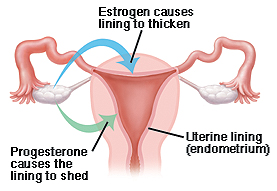Perimenopause
Menopause occurs when you stop having periods for good. For many women, this happens around age 50. The time of change before this is called perimenopause. It may start in your late 30s or 40s, and can last for months or years. During perimenopause, the body produces lower levels of female hormones. This causes certain changes in your body. You may already have begun to feel the effects of these changes. By taking steps to relieve symptoms, you can feel your best.
Signs of Perimenopause
During perimenopause a decrease in female hormones can lead to physical and emotional changes. Even if you've had a hysterectomy (surgery to remove the uterus), but still have your ovaries, you will likely notice some changes. Symptoms may include:
-
Periods that come more or less often, or are lighter or heavier than you're used to.
-
Hot flashes, night sweats, or trouble sleeping.
-
Vaginal dryness, which may make sex painful.
-
Mood swings or fatigue.
The Menstrual Cycle
Hormones are chemicals that carry messages throughout your body. The menstrual cycle is caused by changing levels of two female hormones, estrogen and progesterone. These are made by the ovaries. During a normal menstrual cycle, estrogen prepares the uterine lining for a possible pregnancy. When estrogen levels reach a certain point, the ovaries release an egg (ovulation). Progesterone levels start to rise. If the egg is not fertilized, progesterone drops, causing the thickened lining to shed. This is the menstrual period.

During Perimenopause
Menopause occurs when the ovaries stop working completely. During the months or years leading up to this, the ovaries begin to produce hormones less regularly. Some months, estrogen levels may be too low to cause ovulation. Or, progesterone levels may not be high enough to cause a period. This means your menstrual cycle will become harder to predict. When estrogen levels reach their lowest point, periods will stop completely. When this happens, you have entered menopause.
Medications That May Help
Certain medications can be prescribed to help ease the effects of perimenopause. These include:
-
Low-dose birth control pills to help regulate periods. These often contain a combination of estrogen and progesterone.
-
Hormone therapy (HT) to replace some of the estrogen and progesterone your body has stopped producing.
-
Antidepressants to help balance brain chemicals that may decrease as hormone levels go down. Signs of depression can include often feeling sad, worthless, or helpless. If you're depressed, be sure to talk to your healthcare provider.

